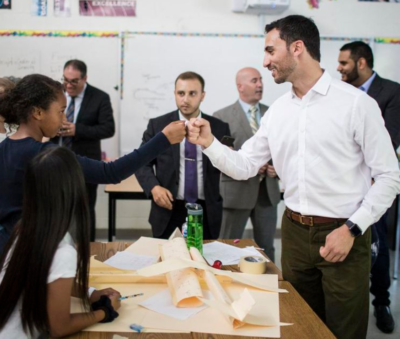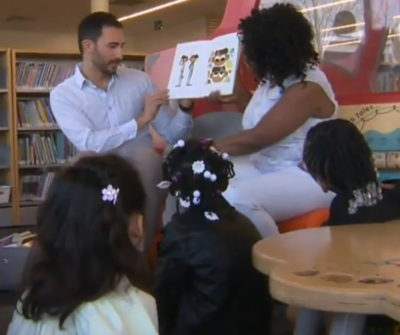 By Pepper Parr
By Pepper Parr
April 17th, 2023
BURLINGTON, ON
The province isn’t happy with the school boards across the province are doing. They don’t like the number indicating where student achievement is waning. They want more power over school boards’ academic priorities and in particular wants to improve training for senior leaders.
Legislated tables today by the Minister of Education would impose new standards of training for directors of education and senior staff, as well as how their job performance is measured, giving trustees a say as well as an opportunity for the Ministry of Education to weigh in.

Education Minister Stephen Leece at a community event.
Minister Lecce said: ““It’s about expecting better from the system,” adding that “Boards need to refocus on what matters, which is student achievement.”
The legislation would also give the government a say in priorities in student achievement, especially in the basics of reading, writing and math, and ensure all 72 publicly funded boards provide information on that progress to parents in a transparent and timely manner, as well as update teacher training at universities.
On the trustee side, the bill would ensure boards are using integrity commissioners to deal with disputes between elected officials in a bid to keep their focus on students.
The bill is also intended, in part, to address the varying academic performance among boards and would give the province a say in “setting priorities for student achievement” as well as usher in “more consistent information (for parents) and approaches to student learning.”
The legislation comes after the province had to step in and supervise and reform the Peel public school board amid allegations of systemic racism. That came three years after the York board failed to act on parent complaints that racist incidents were being ignored, and as multiple incidents of trustee misconduct and dysfunction were brought to light.
More recently, Lecce has publicly chastised the leaders at the Halton District School Board for failing to deal with the controversial dress of a shop teacher that led to months of disruption at Oakville Trafalgar High School, including protests and bomb threats.
The Halton board, which more than a month ago voted to bring in a special adviser to help it move forward, has yet to do so. It also released promised a “professionalism policy” but parents are calling for more specifics on standards of dress for educators.

Minister Leece with a group of students.
The focus on the basics may be in response to parent concerns that boards are focusing too much on non-academic issues.
The province is making a number of changes with the legislation, noting that while Ontario has a 89 per cent graduation rate after five years, some 15,000 students aren’t earning a diploma in that time. EQAO results in math have been an ongoing concern, as have those in literacy, where roughly two-thirds of students in grade 3 aren’t meeting the writing standard, which is equivalent to a B grade.
The Better Schools and Student Outcomes Act is wide-ranging legislation that would also speed up disciplinary processes for teachers, particularly in cases where the educator has been found guilty of a crime.
It would also give the province first say when school boards are selling off properties, and will mandate better communication with municipalities. To save costs and but also bring in consistency and help cut red tape, boards would also have a set of standard new school designs to choose when rebuilding.
It comes as the province is focusing on the skilled trades and ensuring students have a pathway to earn a diploma should they choose to take on an apprenticeship in Grade 11.
On Sunday, Lecce announced $180 million for literacy and numeracy supports, saying it would create 1,000 additional teaching positions to help students, many of whom are struggling with post-pandemic learning loss.
NDP Education Critic Chandra Pasma expressed disappointment with Minister Stephen Lecce’s recent ‘smoke and mirrors’ announcement, stating that it is unimpressive and fails to address the urgent needs in Ontario’s education system:
“The government talks about accountability but blindsides us with last-minute changes to the education sector without adequate funding for meaningful change,” Pasma stated. “As a parent, this announcement is frustrating and feels like smoke and mirrors. The underfunding of our education system is impacting our kids directly. We know why they are struggling – oversized classrooms, lack of specialized learning programs, and anxiety levels at an all-time high. How can students focus and succeed in such conditions?
“Adding new demands at this pace sets our students up for failure,” Pasma emphasized. “We need a government that truly address the scale of issues we see in the education system, including huge class sizes, issues with violence and mental health.”
Pasma further raised concerns about the government’s approach to funding, citing the disparity between the government’s stated increase of 2.7% in GSNs (Grants for Student Needs) and the much higher inflation rates of 6.8% in 2022 and the predicted 3.6% for 2023.
“How will this meagre increase in funding help when inflation rates are much higher, and the scale of issues in education requires much more support?” Pasma questioned. “We need a government that takes responsibility and stops shifting the blame for the fact that schools are struggling. The funding announcements are well below the inflation rate, and more is needed to address the scale of issues we see in our education system. The government’s failure to adequately fund education hinders the system’s ability to provide quality education to our students.”



















